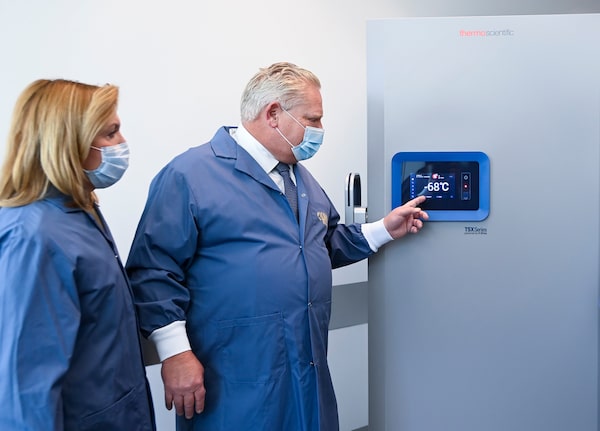
Ontario Premier Doug Ford and Ontario Health Minister Christine Elliott look at freezers ahead of COVID-19 vaccine distribution in Toronto on Dec. 8, 2020.Nathan Denette/The Canadian Press
The head of Ontario’s vaccine task force says the province expects almost 100,000 doses of the Pfizer coronavirus vaccine to arrive this month, with health care workers in long-term care to receive the first shots next Tuesday at hospitals in Toronto and Ottawa.
Retired general Rick Hillier, who chairs the task force, revealed details about Ontario’s COVID-19 vaccine rollout on Thursday, after most provinces had already released their plans. Mr. Hillier said 6,000 Pfizer doses will arrive in the province on Monday, and the first vaccinations will take place at a facility in the University Health Network in Toronto and The Ottawa Hospital. Each site will receive 3,000 doses, Mr. Hillier said, enough to immunize 1,500 health care workers in long-term care facilities and other high-risk settings beginning on Tuesday. The Pfizer vaccine requires two doses, 21 days apart. Mr. Hillier said another 90,000 Pfizer doses are expected this month and will be distributed to 13 hospitals across the province, with up to 23 locations to serve as vaccination centres.
When will Canadians get COVID-19 vaccines? The federal and provincial rollout plans so far
Mr. Hillier also said the province expects to receive 35,000 to 85,000 doses of the Moderna vaccine in December, once Health Canada approves it. That vaccine does not require the same -70C storage as Pfizer’s, and Mr. Hillier said it will be easier to get to long-term care residents directly.
The details come as Ontario reported its highest daily number of coronavirus cases – 1,983, including 35 new deaths – and updated modelling forecast that the number of cases would continue to grow.
Mr. Hillier called the vaccinations “the most incredible thing” for the province, but cautioned it will be a long road to normal life.
“We cannot vaccinate every single person in Day 1, so people do have to be patient,” he said.
The University Health Network comprises several hospitals and a research centre in Toronto, a region currently in lockdown. The province did not say which site will administer the vaccines. The province said it chose Ottawa, which has a lower number of COVID-19 cases, as the other location as a test of how to ship the vaccines from Toronto, and because of long-term care outbreaks there. Peel Region, which includes the cities of Mississauga and Brampton, is also under lockdown. Lawrence Loh, Peel’s Medical Officer of Health, said he expects the vaccine will be distributed at hospitals in Peel “before the year is through.” Brampton Mayor Patrick Brown said he has received assurances that Peel health care workers will be among the first to receive it.
“If there’s any indication that there is preference being given to Toronto health care workers and Toronto long-term care workers that would be wrong and unethical given the fact that Peel Region has a greater prevalence of COVID-19 right now,” Mr. Brown said.
Premier Doug Ford said in a statement that more details about Ontario’s vaccine rollout plan will be released on Friday.
Health Canada approved the Pfizer vaccine on Wednesday, and Prime Minister Justin Trudeau said 30,000 initial doses will begin to arrive in Canada next week.
Opposition parties have criticized Mr. Ford’s government for the lack of details on its vaccination plans. “There are still many outstanding questions about exactly how vulnerable Ontarians will be prioritized for vaccination,” NDP deputy leader Sara Singh said, including who is next, how people will book appointments and how vaccines will reach rural residents.
The province has said it will give priority to long-term care residents and health care staff in areas with the highest rates of COVID-19 transmission in Ontario’s red zones and lockdown regions, although Ottawa is in the less-stringent orange zone.
Earlier on Thursday, Solicitor-General Sylvia Jones told reporters the first vaccination sites are being screened for security to address the possibility of theft.
Meanwhile, Ontario’s scientific advisers forecast that case numbers will continue to grow – but with the percentage of positive tests appearing to flatten. The number of deaths, however, is also expected to keep rising.
Plus, for the next month, the number of COVID-19 patients in intensive care units is expected to remain above the 200-bed level that severely strains hospitals.
With a report from Jeff Gray.
Science reporter Ivan Semeniuk outlines how Canada benefited from researchers working in parallel and accelerated the approval process to have a safe COVID-19 vaccine ready so quickly.
Our Morning Update and Evening Update newsletters are written by Globe editors, giving you a concise summary of the day’s most important headlines. Sign up today.
 Laura Stone
Laura Stone